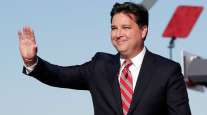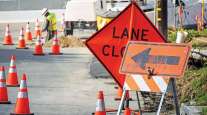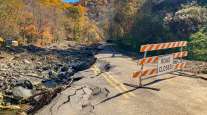Infrastructure Funding Headed for ‘Fiscal Cliff,’ Transportation Official Warns
WASHINGTON — The federal government’s main source of transportation funding is headed for its own “fiscal cliff” unless Congress acts to pay for infrastructure needs that are critical to the economy, a transportation official said Nov. 21 during an American Highway Users Alliance conference.
The Highway Trust Fund will go broke in 2015 because of declining fuel tax revenue, and it’s an issue that many members of Congress don’t understand, Bud Wright, executive director of the American Association of State Highway and Transportation Officials, said during a panel discussion at the alliance’s “Infrastructure for the Future” conference.
“What we need is a long-term, sustainable form of revenue,” he said. A federal fuel tax increase that would cost users about $1 more per week would be sufficient to grow and sustain the Highway Trust Fund, which pays for surface transportation and is mostly supported by a 24.4 cent-per-gallon diesel tax and 18.4 cent-per-gallon gasoline tax that haven’t been increased in 20 years, he said.
Retailers, manufacturers and freight haulers joined in highlighting how a crumbling infrastructure hurts the economy. Shipments get delayed by congestion, adding costs to consumers, they said. Matthew Shay, president of the National Retail Federation, said infrastructure is as important to his organization as the online sales tax and the Affordable Care Act, also known as Obamacare.
The challenge is convincing members of Congress who are “infrastructure deniers” and opposed to tax increases, American Trucking Associations President Bill Graves said. Americans will have to pay more in some form or fashion for the roads and bridges that are the “circulatory system” of the economy, he said.
Sen. Barbara Boxer (D-Calif.), who is chairwoman of the Environment and Public Works Committee, reiterated that she’s open to exploring a sales tax on the price of fuel instead of the current per-gallon tax. Rep. Bill Shuster (R-Pa.), who is chairman of the House Transportation Committee, said, “We have to make the case to the citizens first that there is a problem.”




